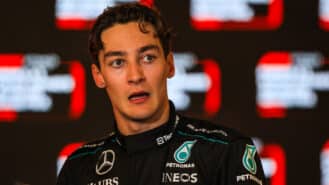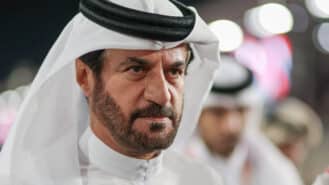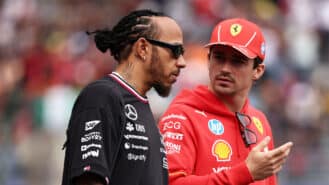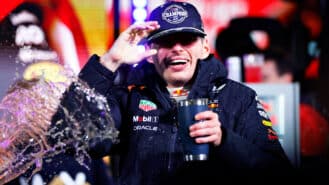
Verstappen proves Russell right: Abu Dhabi GP 2024 – Up/Down
Verstappen's prang at the first corner of the F1 finale in Abu Dhabi vindicated George Russell's recent rant
Watching Le Mans on TV from across the Atlantic was both a pleasure and a source of depression. It was great to see a classic long-distance race featuring superbly prepared factory cars and teams with cutting edge technology, but depressing to consider that we may never again see the latest Le Mans prototypes race in our American long-distance classics at Daytona, Sebring and Road Atlanta.
Next year’s Daytona 24 Hours, Sebring 12 Hours and Petit Le Mans will be rounds of the new Unified SportsCar Racing series as the ALMS and Grand-Am merge. At this point, it’s unclear how the ALMS’s faster LMP cars will be equated with Grand-Am’s more restrictive Daytona Prototypes. It’s believed the P1 category will disappear but it’s still hard to imagine how the Unified Sports Car Series will produce a formula to successfully balance the performance of vastly different P2 and DP cars. So we await with interest the announcement of next year’s rules package.
Jim France is the godfather of Unified SportsCar Racing and was an honoured guest at Le Mans this year, waving the green flag to start the race. France is the younger brother of the late Bill France Jr, who ran NASCAR for almost 30 years from 1972-2000. Jim is the vice chairman and executive vice president of NASCAR and chairman and CEO of the International Speedway Corporation. He’s a longtime fan of sports car and motorcycle racing and founded the Grand-Am in 1999.
Last year France and Don Panoz agreed it was time to bring the Grand-Am and ALMS together. Now they face the challenge of finding the right compromise between two very different philosophies.
A few years ago the ALMS enjoyed the pizazz of the factory Audi team and Roger Penske’s Porsche P2 team but recent years have been nothing like as attractive. Greg Pickett’s team won last year’s ALMS championship with a Honda Performance Development P1 car, beating Rob Dyson’s team of Lola-Mazda P1 cars and this year looks like a repeat of last year.
With little depth in P1 or P2 cars the ALMS finds itself struggling to draw crowds at some of its races. Last month’s ALMS race at Laguna Seca drew a disturbingly small crowd and even Sebring, renowned as a Spring Break party, was down this year. The Grand-Am does no better, worse in fact, with very thin crowds at most races, so it’s important for next year’s unified series to get the formula at least vaguely right.
Will the new series be able to satisfy the disparate goals of achieving close, competitive, affordable racing while encouraging innovation and new technology? Skeptics abound, but it’s the last hope for American racing because NASCAR is committed to an increasingly antique formula and IndyCar is trapped in a Catch 22 dead end with a shrinking audience and commercial base stoking a fear of new technology.
For years, many of us have lamented the ossification of American motor racing. NASCAR’s emergence as the big dog of American racing seemed to cajole everyone else, save the ALMS, into following the NASCAR model of restricting the cars as much as possible to chase after close, competitive racing, resulting in the arrival of the great spec car plague.
The challenge now is to get away from that mentality and reverse American motor racing’s backward slide. Can the Unified SportsCar series retain the ALMS’s link with Le Mans and international sports car racing while making the merger between the Grand-Am and ALMS work for all parties? It’s a baffling conundrum.

Verstappen's prang at the first corner of the F1 finale in Abu Dhabi vindicated George Russell's recent rant

FIA president Mohammed Ben Sulayem seemed intent on making F1 a united front by the end of the 2024 Qatar GP – against him

Leclerc erupted after feeling wronged one time too many by Sainz in Vegas – but the challenge posed by his team-mate next year, Lewis Hamilton, will be much greater writes James Elson

2024 has been Max Verstappen's masterclass – it should go down in history as one of F1's greatest titles